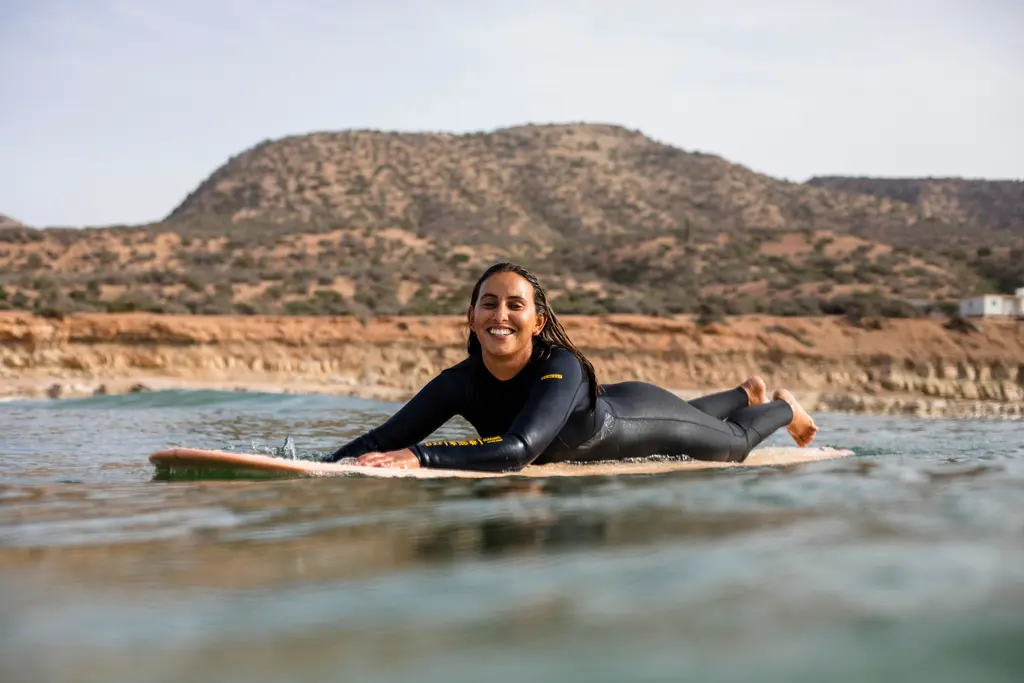It's here! The world’s first wetsuit that doesn’t screw up the planet
- Text by Tenelle Ottley-Matthew
- Photography by Vincent Colliard

For years, neoprene foam has been the go-to material used to make wetsuits. It might not be the first thing that crosses your mind as you hit the waves, but wetsuit manufacturers and surfers have relied on this synthetic rubber since 1951, when the first neoprene wetsuit was made. It’s a synthetic rubber that’s made with petroleum, it’s non-renewable, but until now it’s all that we’ve had.
Now American-based outdoor clothing company Patagonia has revealed the world’s first neoprene free wetsuit line, a groundbreaking move for the industry. The new suits have been developed in partnership with rubber company Yulex, and are made of a natural plant-based rubber from sources in Guatemala that are Forest Stewardship Council certified by the Rainforest Alliance. It’s a certification that ensures Patagonia’s manufacturing process doesn’t contribute to deforestation, and even the lining is made from 100% recycled polyester. In short, surfers can now really reduce their carbon footprint while ensuring their gear is up to scratch.
By manufacturing wetsuits with natural rubber instead of conventional neoprene, carbon dioxide emissions will be reduced by up to 80 percent, Hub Hubbard, Patagonia’s wetsuit Product Development maestro tells us. “Part of our mission statement is to reduce unnecessary harm, so the chance to replace neoprene with natural rubber is part of our DNA… making the switch is a no-brainer.”
Neoprene has been favoured for its insulation properties, durability and chemical/weather/ozone resistance, but the non-renewable material isn’t known for being eco-friendly. The petroleum used in neoprene in a non-renewable resource, drilled up from the depths of the earth with disastrous consequences for the planet.
Unlike most companies and corporations, often keen to trademark and patent technology to keep them ahead of the game, Patagonia is keen to share their innovation with other companies to encourage the use of sustainable materials throughout the industry. It’s a bold move. “Hopefully by drawing a line in the sand with our wetsuit line, and going fair trade on our entire board short and swimwear line for Spring ’17, the surf industry will take notice and start to turn the ship in a positive direction,” says Hub.
For Hub, working on the Yulex wetsuits was a particularly special experience, even with 20 years of wetsuit craftsmanship under his belt. “I saw that first little chip of rubber from Yulex and know how many hurdles have been overcome to make this happen. It’s literally the biggest shift in the surf/wetsuit industry since there’s been an industry.
The launch of the Yulex natural rubber wetsuits proves that it is possible for surf and sustainability to go hand in hand, and lighten its global impact on the environment. By using renewable materials to construct surfing gear, the industry can reduce its dependency on petrochemicals and ultimately, their carbon footprint.
Can complete sustainability truly be achieved in the surf industry? Hub believes that those in all parts of the industry can work together to do their bit to take better care of the environment, and each other. “If you look at the beautiful places we get to play, it goes without saying we should do everything we can to keep them pristine. It’s not just about the materials and products we use, but also the health and well-being of every person along the supply chain.”
The Natural Rubber Yulex wetsuits can be purchased from Patagonia and Down The Line Surf.
To test them for yourself, catch the Patagonia Yulex Wetsuits Tour in locations across the UK, 20th – 28th August.
Enjoyed this article? Like Huck on Facebook or follow us on Twitter.
You might like

Maryam El Gardoum is breaking new shores for Morocco’s indigenous surfers
The Amazigh Atlantic — Through her groundbreaking career and popular surf school, the five-time Moroccan champion is helping women find their places in the waves.
Written by: Sam Haddad

Volcom teams up with Bob Mollema for the latest in its Featured Artist Series
True to This — The boardsports lifestyle brand will host an art show in Biarritz to celebrate the Dutch illustrators’ second capsule collection.
Written by: Huck

A new documentary spotlights Ecuador’s women surfers fighting climate change
Ceibo — Co-directed by Maddie Meddings and Lucy Small, the film focuses on the work and story of Pacha Light, a wave rider who lived off-grid before reconnecting with her country’s activist heritage.
Written by: Hannah Bentley

The rebellious roots of Cornwall’s surfing scene
100 years of waveriding — Despite past attempts to ban the sport from beaches, surfers have remained as integral, conservationist presences in England’s southwestern tip. A new exhibition in Falmouth traces its long history in the area.
Written by: Ella Glossop

In Queens, local surfers are moulding a neighbourhood in their own renegade images
Rockaway breaks — On a little-known stretch of beach in eastern New York City, an ecosystem of wave catchers, and the local bars and restaurants that fuel them, is seeing a boom. Paolo Bicchieri meets the residents and business owners behind the growing swell.
Written by: Paolo Bicchieri

Two years since Patagonia’s founder gave everything away, what does it mean now?
The Announcement — In 2022, the outdoor clothing and equipment brand’s billionaire owner Yvon Chouinard revealed that he was handing his entire company over to fight the climate crisis. Now, podcaster Matt Barr has released a deep dive into the seemingly seismic move, and we caught up with him to hear about his findings.
Written by: Isaac Muk



